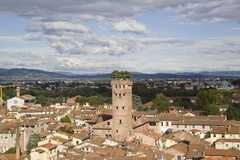Tuscany / Italy
Lucca
For those who want to breathe in the Tuscan air but avoid sharing it with too many tourists, Lucca’s old town could be just the ticket.
With its imposing red-brick ramparts and grassy moat Lucca is not at first glance the most welcoming of getaway spots. But in well-trodden Tuscany the city’s old town is a relatively safe haven from the tourist onslaught that has overrun its more famous neighbours of Siena and Florence.
For one, the city lacks the big-ticket monuments: no leaning tower or supersized work by a Renaissance archistar. Opera buffs do flock to see the birthplace of Puccini but around the corner, shopkeepers, tailors and dressmakers get on with their work and tourist tat is kept to a tasteful minimum. The 2 sq km historical centre is a cycle-friendly zone on a par with Amsterdam and a morning jog around the fortified walls works out to be a comfortable 5km run.
With services a minute’s walk from your doorstep, the old town is the perfect option for a pied-à-terre or even as a second base of operations. “What I like about living in Lucca is that you can walk and ride a bike everywhere and get to nature in minutes,” says Dino Raccanello, a Sydney native who selected the Tuscan town to settle in and set up the European office of his design practice. “It’s strategic: Pisa airport gets you most places and you can drive there, drop off the car and go in minutes.”
Local attractions are also easy to reach. From the underground carpark located in the old town it is an hour’s drive to the slopes for skiing. Come summer, the whitewashed cabanas and well-groomed beach clubs of Forte dei Marmi, together with the neighbouring art galleries and boutiques in Pietrasanta, are fewer than 30 minutes away.
The local
Paola Sausa
Architect at Momus Architetti
“The city feels like a village. Everything is close at hand. It has the charm of Siena but without the crush and in 20 minutes you are at the beach.”
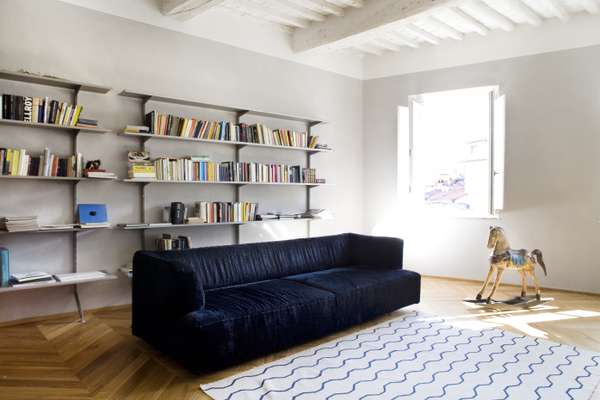
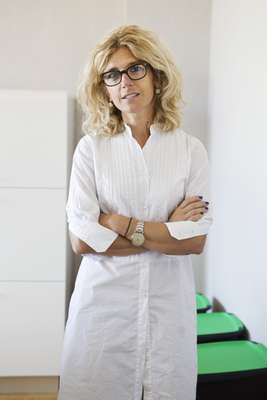
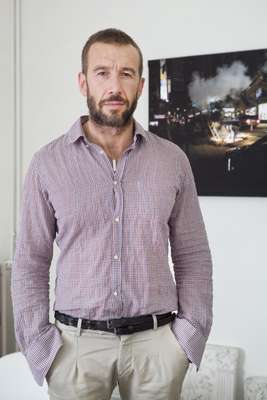

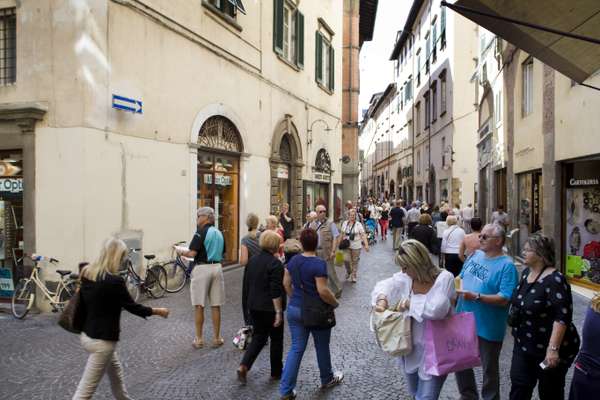
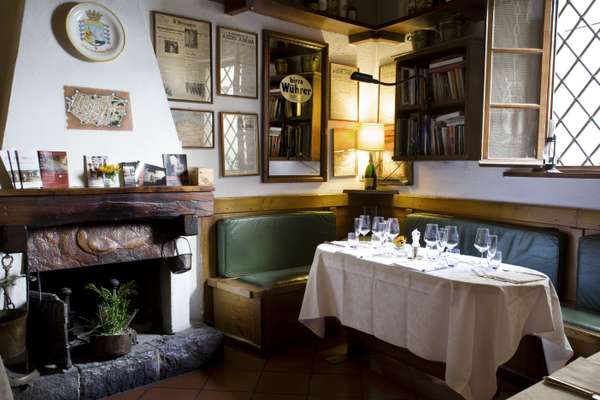
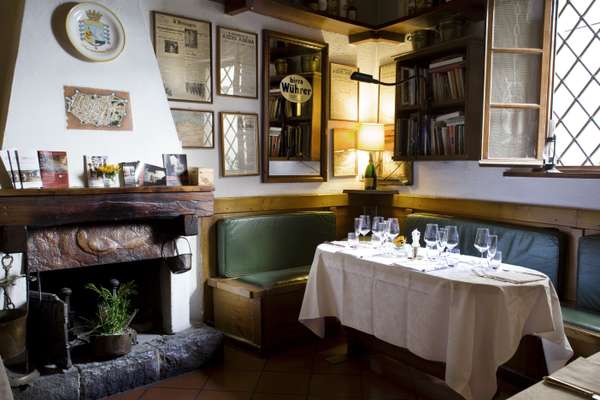
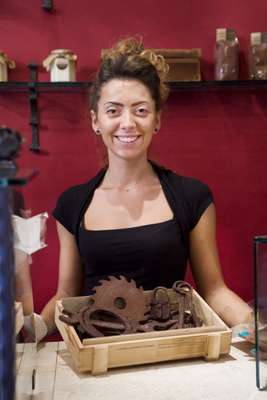
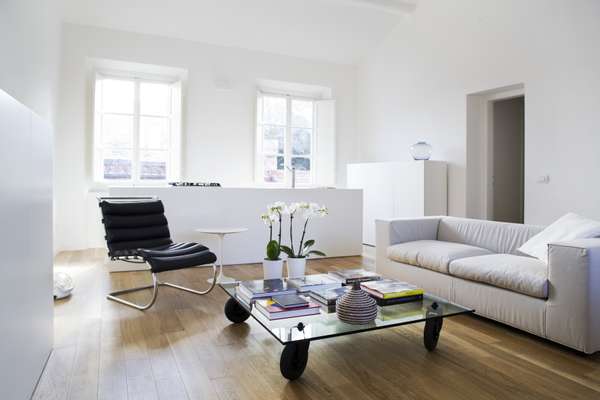
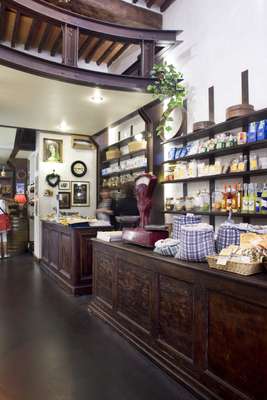

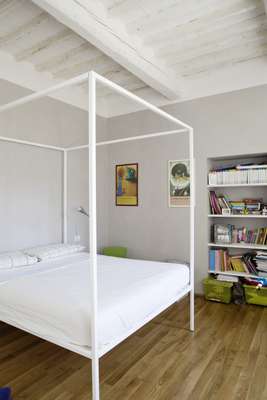
Architecture
Bearing in mind Lucca’s Renaissance-era walls, property seekers will have to forego the convenience of a lift as most palazzi are not equipped with them. It is best to avoid an address on via Fillungo – the main shopping artery – or via San Paolino since tourist traffic passes through these streets. Nab yourself a top-floor flat and you may be lucky enough to get an altana, which is a covered roof terrace; views to the north will offer a glimpse of the Apuan Alps. Inside, many residences and public buildings feature decorative cement-tile flooring made by Tessieri, a local manufacturer founded in 1902 that has an archive of over 300 patterns.
Stay
Palazzo Guinigi
Via Guinigi 21
+39 0338 527 7182
palazzoguinigi.it
The ideal base for house hunting. Three spacious apartments in a former palace are set on a quiet side street and furnished with a kitchen and washing machine.
Shops
Cacioteca
Via Fillungo 242
+39 0583 496 346
Popular cheese shop – with its own ageing room – that sells over 100 varieties, including the local pecorino della Garfagnana.
Caniparoli Cioccolateria
Via San Paolino 96
+39 0583 53456
caniparolicioccolateria.it
This artisan chocolatier makes tasty bars filled with hazelnuts, pralines and five – five! – flavours of creamy chocolate spread. The truffles aren’t bad either.
Tenucci
Via Fillungo 54
+39 0583 491 332
tenucci.com
Old-school clothiers that stock smart outerwear from Aspesi and stylish jackets from Montedoro.
Enoteca Vanni
Piazza del Salvatore 7
+39 0583 491 902
enotecavanni.com
This family-run wine shop has 4,000 labels cellared in its centuries-old cantina.
Prospero
Via Santa Lucia 13
bottegadiprospero.it
Since 1790, the Marcucci family store has supplied dried beans, lentils, flour and other Tuscan staples.
Eat & Drink
Emporio del Sale
Via dell’Anfiteatro 23
emporiodelsale.com
Stand-up wine bar with an ever-changing selection of red and white vintages.
Da Pasquale
Via del Moro 8
+39 0583 496 506
dapasquale-lucca.com
Lucca’s best eatery inside the old walls does an innovative take on Tuscan food. Plates are prepared by a Sicilian chef and paired with the owner’s well-curated list of wines.
Buca di Sant’Antonio
Via della Cervia 3
+39 0583 55881
bucadisantantonio.it
In colder months, locals sit in the cosy dining room to enjoy tortelli Lucchesi (meat ravioli).
Property Guide
Overview
It is best to use a property agent when buying in Italy. Once you’ve found a home, a preliminary contract (compromesso) is drawn up. The buyer pays a non-refundable deposit of 10 to 30 per cent of the purchase price. Expect to pay the estate agent 3 per cent in fees, which may be payable at the compromesso. After signing the final contract (rogito notarile), the purchaser pays the remaining sum, the mandatory notary fee (about 1 per cent), solicitors fees (if applicable) and purchase tax. Buyers will also need to obtain an Italian tax code number (codice fiscale). Budget 10 to 12 per cent of the purchase price to cover all fees.
Prices
1 bedroom, €300,000 2 bedrooms, €450,000 3 bedrooms, €630,000
Estate agent
Ser. Imm. is a local agency with properties in the city centre, surrounding hills and Tuscan seaside. Staff speak English and the firm is partnered with UK agents Knight Frank.
Via della Fratta 19, +39 0583 467 450
serimm.net
Why Lucca is the best city to retire to:
- The city centre has a compact footprint as well as being flat and closed to car traffic.
- From nearby Pisa airport there are year-round flights on major carriers to London, Paris and Munich.
- Elements of the Mediterranean diet are easy to source locally (olive oil, legumes, fish and red wine).
- The tree-shaded path atop the ramparts is perfect for afternoon walks or a leisurely bicycle ride.
- At Bagni di Lucca (30 minutes from the city centre) you can partake of the curative waters at the hot springs to combat respiratory ailments and backaches.

